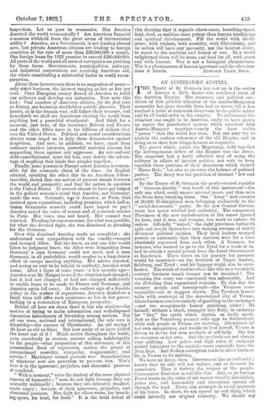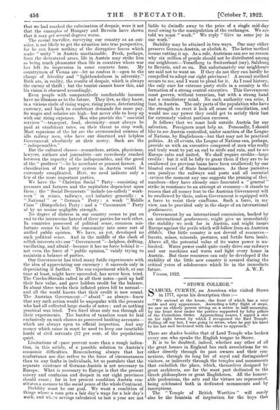AN AUSTRIAN ON AUSTRIA. T HE Treaty of St. Germain has
cast up in the centre of Europe a little State—the mutilated torso of the Austrian Empire. The economic and political con- dition of this pitiable inheritor of the Austro-Hungarian monarchy has gone steadily from bad to worse, till it has reached a point of ruin most dangerous to the public safety and to all social order in the country. To understand the situation one ought to be Austrian, ought to have grown up under the paradoxical system which somehow held Austria-Hungary together—surely the least stable e power " that the world has seen. But one may try to explain the surface coherency of the old Empire, and in doing so to show how things became so desperate.
The power which, under the Hapsburgs, held together the heterogeneous tribes of the Empire was the Army. The emperors had a fairly effective way of using the military in affairs of interior politics, not only to keep together those portions of their dominions which desired "Home Rule," but also to preserve the balance of political parties. The Army was the guardian of internal "law and order."
By the Treaty of St. Germain the newly-created republic of " German-Austria " was bereft of this instrument—the only one which could ensure internal peace, and thus save the State from breaking down. Our " Army " now consists of 30,000 ill-disciplined men belonging exclusively to the " social-democratic " party. So the new Central Govern- ment has never wielded real authority. The component Provinces of the new confederation at the outset ignored its laws, and it was, and remains, too weak to enforce its orders. Officially "united," the eight provinces forthwith split and resplit themselves into warring sections of widely divergent political opinion. Their local leaders usurped powers so autocratic that their districts were for a time absolutely separated from each other. A Viennese, for instance, who wanted to go to the Tyrol for a week or so, had to obtain a special permit from the Local Government at Innsbruck. Three times on his journey his passport would be inspected—on the frontiers of Upper Austria, Salzburg, and Tyrol : and his luggage might also be over- hauled. The result of mediasvalisui like this on a twentieth century business man's temper can be imagined I The vexation (for every one concerned) was unbearable. And the ill-feeling thus engendered remains. To this day the country people and townspeople—the Viennese more especially—are at daggers drawn. The Tyrolean farmer talks with contempt of the demoralized city of Vienna, where business consists entirely of gambling in the exchanges —not too scrupulously honest gambling, either ! He himself, without a blush, smuggles into Italy, in exchange for "lire," the cattle which Austria so badly needs. Just as the Vorarlberg peasant sells eggs to Switzerland, while sick people in Vienna are starving. Abandoned by her own compatriots, and unable to feed herself, Vienna is driven to devise her own methods of sell-help. She has no resources of her own. And the methods are not always very edifying. Low prices and high rates of exchange attract foreigners to the capital—more especially from the Near East. And Balkan corruption tends to infect business life in Vienna to its undoing. We have no Army, then. Government has no authority ; knows that its rule will not endure, and so discards its conscience. Thus it forfeits the respect of the people. Communism flourishes in soil like this. And, as no foreign Power trusts us, the value of our money steadily diminishes, prices rise, and immorality and corruption spread all through the land. Every one attempts to avoid payment of his taxes. In short, we are spared no evil thing which could intensify our original calamity. We should say that we had reached the culmination of despair, were it not that the examples of Hungary and Bavaria have shown that it may get several degrees worse. The casual traveller, surveying our country as an out- sider, is not likely to get the situation into true perspective, for he can know nothing of the disruptive • forces which make " unity " in Austria unattainable. Fresh, perhaps, from the devastated areas, life in Austria may strike him as being much pleasanter than life in countries where war has left its impression in some concrete form. My countrymen of Vienna are—let us confess it—open to the charge of frivolity and "lightheadedness in adversity." Both are, in reality, the results of despair, which is always the enemy of thrift • but the tourist cannot know this, and his vision is obscured accordingly. Even people with comparatively comfortable incomes have no illusions as to the future. They live, as they know, in a vicious circle of rising wages, rising prices, deteriorating currency, and back to exorbitant demands for more pay. So wages and salaries are high—but never able to keep up with our rising expenses. Men who provide the " essential services "—transport, food, electricity—must always be paid at exorbitant rates, on their threat to stop work. Most rapacious of the lot are the overcrowded swarms of idle railway men, who have our disarmed and helpless Government absolutely at their mercy. Such are the " indispensables."
But the cultured classes—researchers, artists, physicians, lawyers, authors and journalists—are mercilessly crushed between the rapacity of the indispensables, and- the greed of the " profiteer "—be he merchant or peasant farmer. A classification of the party system in Austria would be extremely complicated. Here, we need indicate only a few of the more important parties. We have the "Christian Social" Party—consisting of peasants and farmers and the capitalists dependent upon them : the" Social Democrats " include (so-called) " work- men " in mines, railways, and industry generally : a " National " or " German " Party : a weak "Middle Class" (Bfirgerliche) Party : and a " Communist " Party of by no means negligible strength.
No degree of distress in our country seems to put an end to the internecine hatred of these parties for each other. In countries possessed of political sense, common mis- fortune seems to knit the community into some sort of unified public opinion. We have, as yet, developed no such political sense. And in the middle of the clash of selfish interests sits our " Government "—helpless, drifting, vacillating, and afraid—because it has no force behind not even the force of "public opinion," vainly trying to maintain a balance of parties.
Our Government has tried many futile experiments with the idea of appreciating our currency : it succeeds only in depreciating it further. The one experiment which, at one time at least, might have succeeded, has never been tried. The Czecho-Slovaks called in all their notes—paid up half their face value, and gave holders credit for the balance. In about three weeks their inflated prices fell to normal— and all the world knows that their credit is now sound. The Austrian Government—" afraid" as always—knew that any such action would be unpopular with the peasants who had all collected large stocks of notes ; and so nothing practical was tried. Two fixed ideas only ran through all their experiments. The burden of taxation must be laid exclusively on such classes as possessed banking accounts— which are always open to official inspection. And any money which came in must be used to keep our insatiable horde of civil servants (12 per cent, of the population) quiet.
Limitations of :pace prevent more than a rough indica- tion, in this article, of a possible solution to Austria's economic difficulties. Remembering always that her misfortunes are due rather to the force of circumstances than to any faults in individuals, let us postulate that the separate existence of German-Austria is not necessary to Europe. What is necessary to Europe is that the present misery and confusion and despair in our eight provinces should cease ; for in her present condition Austria con- stitutes a menace to the social peace of the whole Continent. Stability must be our goal. We want a condition of things where a man gets a fair day's wage for a fair day's work, and wits..re savings calculated to last a year are not liable to dwindle away to the price of a single mid-day meal owing to the manipulation of the exchanges. We are told we must " work." We reply "Give us some joy in our work."
Stability may be attained in two ways. One may either preserve German-Austria, or abolish it. The latter method means cutting it up. As a rule, Austrians can see no reason why six million of people should not be distributed among our neighbours—Vorarlberg to Switzerland (say), Salzburg to Bavaria, and so on. But unfortunately our neighbours are said not to want us. If they do not they can hardly be compelled to adopt our eight provinces ! A second method occurs to me, and I want to plead for it. As I read history, the only cure for extreme party strife in a country is the formation of a strong central executive. This Government must govern, without terrorism, but with a strong hand and a conciliatory mind. No such authority can arise, I fear, in Austria. The only parts of the population who have the strength to erect it lack all sense of conciliation, and would use any power they could get to satisfy their lust for extremely violent partisan excesses. It follows that we must look outside Austria for our salvation. Foreigners must help us. Personally, I should like to see Austria controlled, under sanction of the League of Nations, by Englishmen—but that may not be practical politics. At all events, the League of Nations can, perhaps, provide us with an executive composed of men who really and truly want to put an end to strife and ruin, and to see Europe calm and united. We shall require credits—large credits : but it will be folly to grant them if they are to be swallowed (as previous loans have been swallowed) by our bloated crowd of State functionaries. As these parasites can paralyse the railways and posts and all essential ervices the moment any one suggests the pruning of thei numbers—they have already once fomented a " general " strike in resistance to an attempt at economy—it stands to reason that all money lent to the Austrian Government will be swallowed by them, unless Government is equipped with a force to resist their exagtions. Such a force, in my view, can be provided only in the shape of an international gendarmerie.
Government by an international commission, backed by an international gendarmerie, might give us immediately the stability we seek for in Austria, and might insure Europe against the perils which will follow from an Austrian debdele. Our little country is not devoid of resources— forests, mines, minerals, pastures, and fertile farm lands. Above all, the potential value of its water power is un- limited. Water power could quite easily drive our railways and our machines and warm and light every house in Austria. But these resources can only be developed if the stability of the little new country is assured during the critical years of adolescence which lie in the immediate







































 Previous page
Previous page